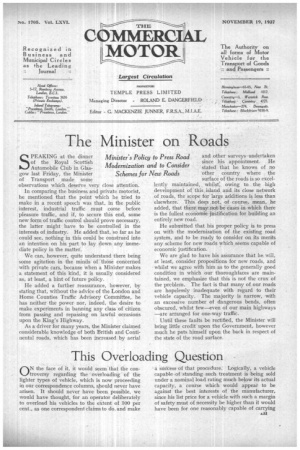The Minister on Roads
Page 1

If you've noticed an error in this article please click here to report it so we can fix it.
PEAKING at the dinner of the Royal Scottish Automobile Club in Glasgow last Friday, the Minister of Transport made some observations which deserve very close attention.
In comparing the business and private motorist, he mentioned that the point which he tried to make in a recent speech was that, in the public interest, industrial traffic must come before pleasure traffic, and if, to secure this end, some new form of traffic control should prove necessary, the latter might have to be controlled in the interests of industry. He added that, so far as he could see, nothing in this could be construed into an intention on his part to lay down any immediate policy in the matter.
We can, however, quite understand there being some agitation in the minds of those coneerned with private cars, because when a Minister makes a statement of this kind, it is usually considered as, at least, a hint of future policy.
He added a further reassurance, however, by stating that, without the advice of the London and Home Counties Traffic Advisory Committee, he has neither the power nor, indeed, the desire to make experiments in banning any class of citizen from passing and repassing on lawful occasions upon the King's Highway.
As a driver for many years, the Minister claimed considerable knowledge of both British and Continental roads, which has been increased by aerial and other surveys undertaken since his appointment. He stated that he knows of no other , country where the surface of the roads is so excellently maintained, whilst', owing to the high .development of this island and its close network of roads, the scope for large additions is less than elsewhere..This does not, of course, mean, he added, that there may not be cases in which there is the fullest economic justification for building an entirely new road.
He submitted that his proper policy is to press on with the modernization of the existing road system, and to be ready to consider on its merits any scheme for new roads which seems capable of economic justification.
We are glad to have his askurance that he will, at least, consider propositions for new roads, and whilst we agree with him as to the generally good condition in which our thoroughfares are maintained, we emphasize that this is not the crux of the problem. The fact is that many of our roads are hopelessly inadequate with regard to their vehicle capacity. The majority is narrow, with an excessive number of dangerous bends, often obscured, whilst few—even of our main highways —are arranged for one-way traffic.
• Until these faults be rectified, the Minister will bring little credit" upon the Government, however much he pats himself upon the back in respect of the state of the road surface.




























